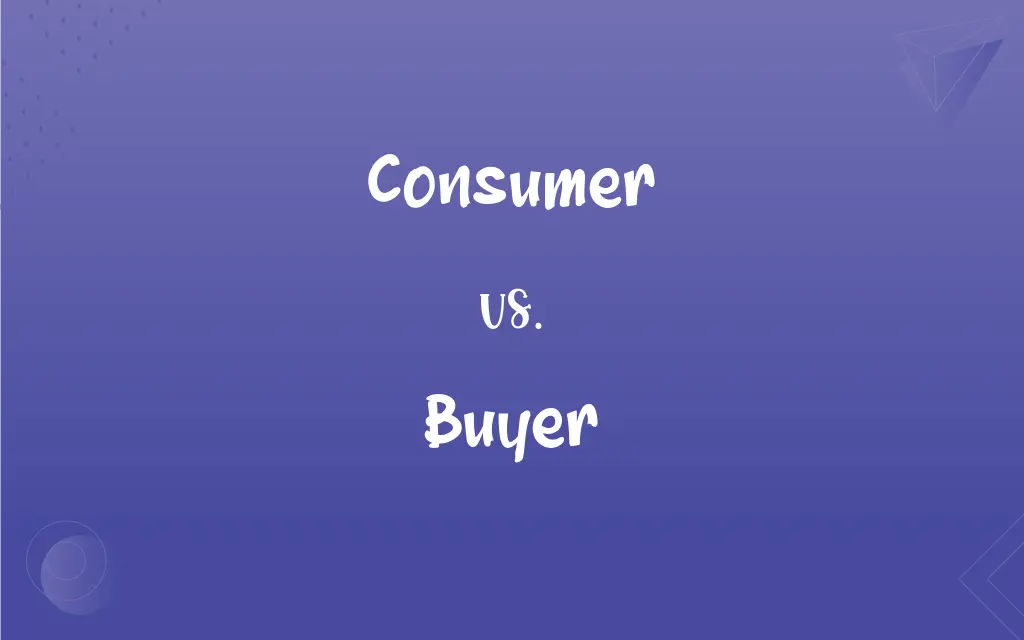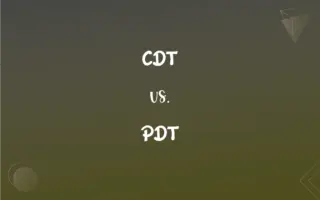Consumer vs. Buyer: What's the Difference?
Edited by Aimie Carlson || By Harlon Moss || Updated on December 20, 2023
A consumer uses or consumes goods or services, while a buyer is the one who purchases them.

Key Differences
A consumer is an individual who uses or consumes goods or services for personal needs or desires. In contrast, a buyer is someone who acquires these goods or services through purchase, which may or may not be for personal use.
The role of a consumer is often passive, focusing on utilizing products for satisfaction or need fulfillment. Conversely, a buyer plays an active role in the marketplace by choosing to purchase items from various options.
Consumers are the end-users in the economic cycle, and their consumption patterns can influence market trends. Buyers, however, are the initiators of these transactions and can be either individuals or entities making purchases.
Consumer behavior is driven by personal preferences, needs, and financial capacity. The buyer’s decisions, on the other hand, may be influenced by factors like price, quality, and availability.
The concept of a consumer extends beyond just purchasing to the actual usage of a product or service. In contrast, a buyer's involvement typically concludes once the purchase transaction is complete.
ADVERTISEMENT
Comparison Chart
Role in Transaction
End-user of products or services
Initiator of the purchasing process
Motivation
Personal satisfaction or need
Acquisition of goods or services
Decision Factors
Preferences, needs, financial capacity
Price, quality, availability
Involvement
Usage and consumption
Selection and purchase
Market Influence
Affects trends through consumption patterns
Influences market through purchasing choices
ADVERTISEMENT
Consumer and Buyer Definitions
Consumer
A consumer is someone who purchases goods for personal use.
The consumer decided to buy organic fruits for health reasons.
Buyer
A buyer is someone involved in the act of purchasing.
As a regular buyer at the store, she was offered a loyalty discount.
Consumer
A consumer is an individual who makes choices about what products to use.
Consumers today are more informed about their buying decisions.
Buyer
A buyer is an entity that acquires products for any purpose.
The company’s buyer sourced materials from overseas suppliers.
Consumer
A consumer is a person who uses goods or services.
The new smartphone app was popular among young consumers.
Buyer
A buyer is a person who purchases goods or services.
The buyer negotiated a better deal for the car.
Consumer
A consumer is a beneficiary of a service.
As a consumer of online streaming services, he watched movies every weekend.
Buyer
A buyer is one who makes financial transactions for goods.
The buyer paid cash to quickly close the deal.
Consumer
One that consumes, especially one that acquires goods or services for direct use or ownership rather than for resale or use in production and manufacturing.
Buyer
A buyer is a participant in the marketplace.
As a savvy buyer, he always researched products before purchasing.
Consumer
(Ecology) A heterotrophic organism that ingests other organisms or organic matter in a food chain.
Buyer
One that buys, especially a purchasing agent for a retail store.
Consumer
One who, or that which, consumes.
Buyer
A person who makes one or more purchases.
Every person who steps through the door is a potential buyer, so acknowledge their presence.
Consumer
(economics) Someone who trades money for goods or services as an individual.
This new system favours the consumer over the producer.
Buyer
(retailing) A person who purchases items for resale in a retail establishment.
The supermarket's new buyer decided to stock a larger range of vegetarian foods.
Consumer
(by extension) The consumer base of a product, service or business.
Our consumers are upwardly mobile and middle-class.
Buyer
(manufacturing) A person who purchases items consumed or used as components in the manufacture of products.
Consumer
(ecology) An organism (heterotroph) that uses other organisms for food in order to gain energy.
Buyer
One who buys; a purchaser.
Consumer
One who, or that which, consumes; as, the consumer of food.
Buyer
A person who buys
Consumer
The person or organization that uses some item of commerce or service in its own acitities, as opposed to reselling the item or including it as part of another item for resale; - called also the end user.
Consumer
A person who uses goods or services
Consumer
A consumer is the end-user in a product’s lifecycle.
As a consumer, she was concerned about the environmental impact of her purchases.
FAQs
What are the main considerations for a buyer?
Buyers often consider factors like price, quality, and availability.
Can a person be both a consumer and a buyer?
Yes, a person can be both if they purchase and then use the product themselves.
What influences a consumer’s decisions?
Personal needs, desires, and financial capacity primarily influence a consumer's decisions.
Is a consumer’s role active or passive in the market?
A consumer typically plays a passive role, focusing on using products.
Can a buyer be a business instead of an individual?
Yes, businesses can also be buyers when they purchase goods or services for operational needs.
What defines a consumer?
A consumer is anyone who uses or consumes goods or services for personal use.
Who is a buyer?
A buyer is an individual or entity that purchases goods or services.
Can a consumer's preferences shape a buyer's decisions?
Yes, consumer preferences can influence what buyers choose to purchase.
How does a buyer influence the market?
Buyers influence the market through their purchasing choices and demands.
Do consumers affect market trends?
Yes, consumer behavior and consumption patterns can significantly affect market trends.
Are consumers directly involved in the purchasing process?
Consumers are typically not directly involved in the purchasing process, unless they are also the buyers.
Are consumers always the end-users?
Typically, consumers are the end-users, although there can be exceptions.
Do consumers play a role in product feedback?
Yes, consumers often provide valuable feedback based on their usage experience.
What is the difference in motivation between a consumer and a buyer?
A consumer is motivated by personal needs or satisfaction, while a buyer is motivated by the acquisition of goods.
How do market trends impact a buyer’s strategy?
Market trends can significantly influence a buyer's strategy in terms of what and when to purchase.
Do consumer laws protect the buyer or the user?
Consumer laws are designed to protect the end-user, who is the consumer.
What role does negotiation play for a buyer?
Negotiation can be a crucial aspect for a buyer, especially in large or complex purchases.
Can a buyer’s actions reflect consumer demand?
Yes, a buyer’s actions often reflect and respond to underlying consumer demand.
How do economic conditions affect buyers?
Economic conditions can impact a buyer's purchasing power and choice.
How important is brand loyalty to a consumer?
Brand loyalty can be significant for consumers, influencing repeat purchases and preferences.
About Author
Written by
Harlon MossHarlon is a seasoned quality moderator and accomplished content writer for Difference Wiki. An alumnus of the prestigious University of California, he earned his degree in Computer Science. Leveraging his academic background, Harlon brings a meticulous and informed perspective to his work, ensuring content accuracy and excellence.
Edited by
Aimie CarlsonAimie Carlson, holding a master's degree in English literature, is a fervent English language enthusiast. She lends her writing talents to Difference Wiki, a prominent website that specializes in comparisons, offering readers insightful analyses that both captivate and inform.






































































